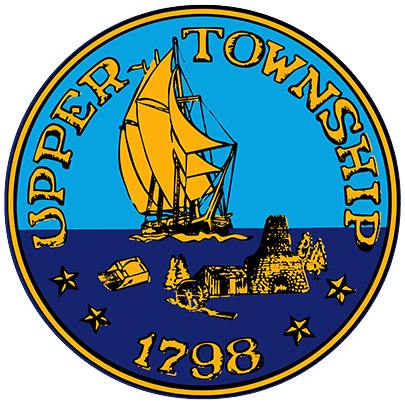History
UPPER TOWNSHIP, ORIGINALLY the home of the Lenni Lenape Indians, is located in the upper most portion of Cape May County. A large land area of 63.4 square miles, the Township is principally rural.
The Township form of municipal government in post-revolutionary New Jersey began with the passage of the Township Act. This law incorporated the original 103 Townships of New Jersey, Upper Township being one of the originals. The early Township Form, as created by the 1798 act, closely resembled the New England town meeting, and was thus a direct democracy. At the annual town meeting the vote was available to white males, at least 21 years old, who were citizens of New Jersey and residents of the township for at least six months; who paid taxes in the township, or who owned land, or rented a home in the township for a rent of at least five dollars a year. On the annual town meeting day, the voters of the township would assemble between 11:00 a.m. and noon. The first order of business was the election of a presiding officer for the township meeting.
The Township Act of 1798 granted the town meeting the following powers: manage and improve common lands, establish and maintain pounds, make provisions for the destruction of noxious wild animals and birds, maintain and support the poor, build and maintain roads, and tax in order to carry out township responsibilities.
The town meeting was also authorized to elect the following officials for a term of one year: a township clerk, one or more tax assessors, one or more tax collectors, three or more “judicious freeholders of good character” to hear tax appeals, surveyors of the highways, one or more overseers of the poor, one or more constables, as many overseers of the highways and pound keepers as deemed necessary or convenient, one “reputable freeholder to serve as a judge of elections,”
Thus, the function of the township committee under the Township Act of 1798 was simply to supervise the expenditure of township funds between town meetings. In a way, the township committee under the original Township Act closely resembled the board of selectmen which supervised the expenditure of municipal funds between town meetings in New England.
In 1899, a sweeping revision of the Township Act was passed. The Township Act of 1899 completely changed the way townships were governed. The town meeting, a township institution for 101 years, was abolished, and all municipal legislative powers were concentrated in the hands of a greatly strengthened township committee.
Instead of merely being a financial watchdog supervising the expenditure of township funds between meetings, the township committee was upgraded to a policy making body, empowered to pass ordinances and make certain appointments. Under the 1899 law, the township committee consisted of three members (the law was later amended to allow for an increase to five members) elected to staggered, three year terms.
The township had few villages before the Revolution. They were Goldins’ or Stites’ Point, Littleworth (now Petersburg) and Williamsburg (now Tuckahoe.) Tuckahoe is the only Indian name remaining in the county or the Township. Literally translated it means where the deer are plentiful or where deer are shy.
At the last census of 2010 the total population of the Township was 12,373. There were 4,566 households with an average family size 3.14 people. The median age is 43.6 with 48.6% of the population is male and 51.4% of the population is female. 26.4% of the population is below the age of 19; 18.8% of the population is between 20-39; 33.9 % of the population is between 40-59; 17% of the population is between 60-79; and 3.9% of the population is over 80.
The Township offers great vacation opportunities. There are beaches in Strathmere, Tuckahoe and Beesleys Point. Campgrounds are located throughout. There are parks, golf courses, and areas for boating and canoeing.
Much of what Upper Township is today is due in part to the many volunteers who serve on the various boards. The Planning and Zoning Boards have done an excellent job controlling business and residential growth to preserve the quality of life.

